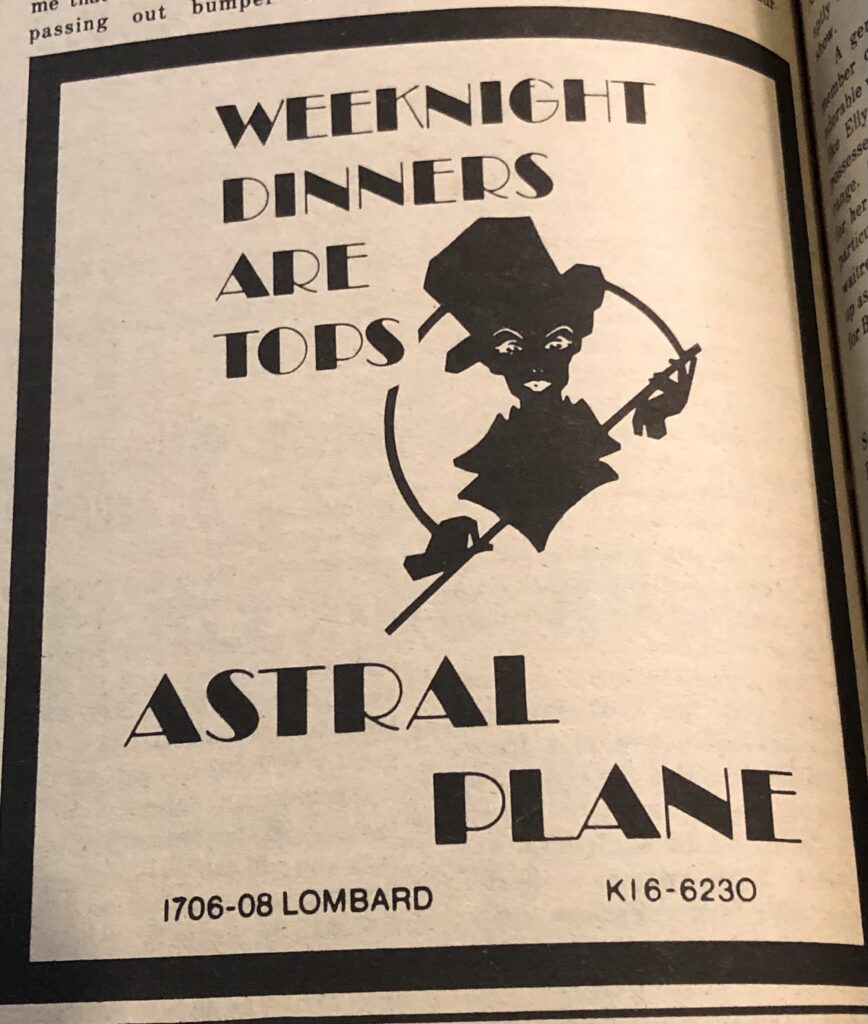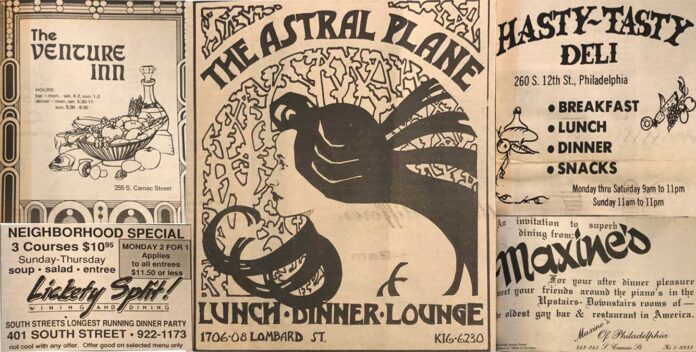The LGBTQ-owned restaurants of the Gayborhood’s past evoke a sense of nostalgia and community that younger queer people may have missed out on. Restaurants like Astral Plane, HASTY-TASTY, Maxine’s and Lickety Split, all of which have closed their doors, were places where queer folks could go to feel a sense of discovery and belonging.
“It’s a place to take your lover where people aren’t going to look at you funny,” said Reed Apaghian, who ran the restaurant Astral Plane for 34 years. “It was a place to go where you could hold hands or kiss, where you’re not going to get thrown out or beat up when you go outside.”
Apaghian opened Astral Plane in 1973 at 17th and Lombard streets. Michael Byrne, who works for Action Wellness, posted on Facebook that Astral Plane was “THE restaurant for special dates, well made cocktails and yummy bites, decorated with old Hollywood pictures of classic gay icons, mismatched cutlery/tableware, glorious wall coverings, furniture, mirrors, lighting.”
In addition to dates, gay couples would celebrate anniversaries and hold engagement parties at Astral Plane. “I had an engagement party almost every Friday night,” Apaghian said. The restaurant was also a hot spot for celebrities, including Bette Midler, Liza Minnelli, Mick Jagger, Patty Duke, Whitney Houston, Joni Mitchell, Celine Dion and many more.

Apaghian, who was also an actor and astrologer, put a lot of thought behind what time of year he opened Astral Plane.
“[Astral’s] sun was in Gemini, and I wanted communication at the tables,” Apaghian said. “I wanted humor, I wanted fun, I wanted laughter – that’s Gemini. I wanted intellectualism, I wanted a salon – that’s Gemini.” Astral Plane’s moon was in Sagittarius, which signifies internationalism, Apaghian said. He employed cooks from all over the world, which made for a diverse menu.
French chef Pierre Wiegand, part owner of Astral Plane, opened La Conversation around the corner. “Fabulous French patisserie,” Apaghian said. “Real butter – all the things that other bakeries cheated on, Pierre never cheated on.”
Before Apaghian opened Astral Plane, Xavier Francois Hussenet, another French chef, opened the ice cream shop-turned restaurant La Banane Noire on South Street. Hussenet and Apaghian became good friends, as did other gay restaurant owners at the time. “I went in there and actually it inspired me to open a restaurant,” Apaghian said. But before he opened Astral Plane, John Weslyck and Dale Shuffler opened Lickety Split at 4th and South streets, right next to La Banane Noire.
“We became a family,” Apaghian said. Before he got his liquor license, he would close his restaurant, go over to Lickety Split and sit at Elizabeth Coffey Williams’ bar. She was another member of the restaurant family.
“I worked with the most extraordinary cast of characters,” Coffey Williams said. She fondly remembers the kitchen staff, who got creative when a customer had a birthday. The cooks would come out into the restaurant, usually without clothing, covered in whipped cream, carrying sparklers and would sing happy birthday to the customer, Coffey Williams said.
“The best way to describe it was that Lickety was a fine restaurant that was designed and run by a bunch of artists,” she said. “Lickety itself was very much like a piece of artwork where you could have a fine meal and a party.”

Other Lickety Split staffers at the time included Georgia, who was an actress; Karon Bahari, a famous rock n’ roller; and waitress/hostess Betsy Green, “who was the queen of all things wild and crazy,” Coffey Williams said.
“It was almost like in some ways going to the theater,” Green said of dining at Lickety Split. “When the movie ‘Amadeus’ came out, we all dressed up in period costumes. For all the holidays we did the same. It was known as being outrageous.” She described the South Street restaurant scene as “a different world at the time. South Street was very liberal in its beliefs. A lot of LGBT people either moved there or congregated there.”
Another popular restaurant in the scene was Knave of Hearts, which chef-owner Ty Bailey opened at 2nd and South in 1975. He later opened the Love Lounge on the second floor of the building, where he sponsored art shows and live music. Early in his career, Apaghian hired Bailey at Astral Plane. “This Geminian knave himself brought many evenings of pleasure, fun and delicious food to the Philadelphia community,” Apaghian said in an email.
Franny DiCicco, former director of Philly Pride Presents and current mayor of Folcroft in Delaware County, owned a coffee shop in Philly decades ago. “It was kind of like with a bar – you have to have your little safe haven where you feel like you have a sense of belonging,” DiCicco said.
DiCicco spoke highly of HASTY-TASTY, which later became Duck Soup and then Cheap Art Cafe, marking the end of its period as a gay hangout. “You went to certain places after you went clubbing,” she said. “You went to the Midtown II on 11th Street, you went to Savoy, you went to Little Pete’s, because everybody you knew would be in there and you felt safe.”
She also mentioned the restaurant Dave Shore’s, which later became the Forest Lounge. “Everybody went there for cocktails,” DiCicco said. “They had the drag shows like you saw in ‘La Cage.’ They spent fortunes on costumes.”
Ed Hermance, former owner of Giovanni’s Room, singled out Russell’s as a Philly restaurant that made him sentimental.
“My first recollection was taking a group of gay authors including Felice Picano, George Whitmore, maybe Edmund White, and maybe one or two more,” Hermance said in an email. “We walked from the store at 12th and Pine through the little streets between Pine and Lombard. One of the New Yorkers [said], ‘so this is what Greenwich Village was supposed to look like.’ I think that was a compliment.”
Queer-owned places still abound in Philly’s Gayborhood, like Tavern on Camac, Level Up, The Bike Stop, Knock, and Woody’s. There are also the restaurants owned by Marcie Turney and Valerie Safran, which include Barbuzzo, Bud & Marilyn’s and Little Nonna’s, which are popular dinner and happy hour spots. But DiCicco indicated that today’s gay-owned and queer-friendly restaurant scene in Philly could stand to be more robust.
“I think because history does repeat itself, I think once we get away from COVID, more places will open up,” DiCicco said.
